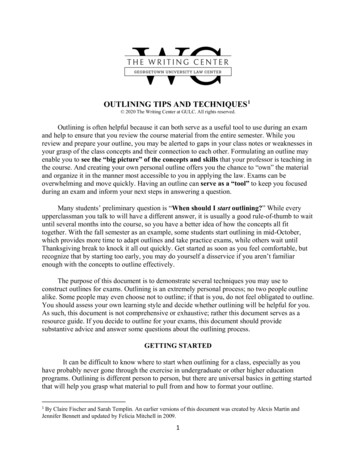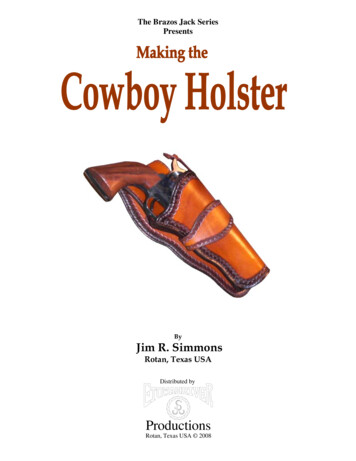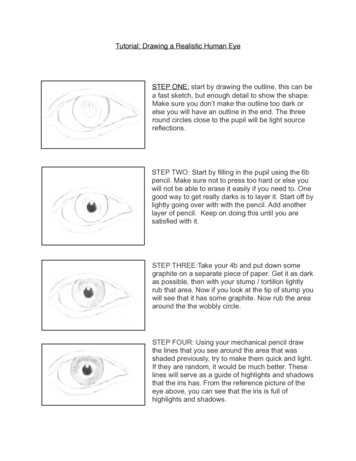
Transcription
Outline of the Book of GenesisOverview of GenesisThe book of Genesis covers a span of approximately 2,450 years. The word “Genesis” means “origin”(Smith’s Bible Dictionary pp. 211). Genesis gives the origins of creation, sin, and death in the first threechapters. A history of mankind is examined in the book with great emphasis being placed upon futureredemption through Jesus and the development of various characters. The promised seed of Genesis 3:15 is thetheme of the entire book. This promised seed is mentioned again in Genesis 12:1-4; 22:18; and 49:10. Thispromised seed is identified as Jesus Christ (cf. Gal. 3:8, 16). Matthew records, “And she shall bring forth a son;and thou shalt call his name Jesus; for it is he that shall save his people from their sins” (Matt. 1:21).Redemption in GenesisGenesis records sin entering into the world and the subsequent dilemma of man (cf. Gen. 3:1ff). Man diedspiritually that day and was in need of reconciliation with God (Rom.5:12; I Cor. 15:21-22). God’s plan, evenbefore the foundation of the world, was to redeem man of their sins (Eph. 1:3-4; I Pet. 1:20) and give them achance at eternal life (Heb. 9:12). We first run into the word redemption in the book of Genesis at chapter48:16. The apostle Paul defines the word redemption as receiving the forgiveness of one’s sins (cf. Eph. 1:7;Col. 1:14). The first hint of man having the opportunity to receive the forgiveness of sins is found at Genesis3:15 and confirmed at Genesis 12:2-3 when God said to Abraham, “And I will make of thee a great nation, and Iwill bless thee, and make thy name great; and be thou a blessing: and I will bless them that bless thee, and himthat curses thee will I curse: and in thee shall all the families of the earth be blessed.” The apostle Paul tells usthat God was preaching the gospel to Abraham on this occasion (Gal. 3:8) and then explains that Jesus would bethis seed promise (Gal. 3:16).Jacob, Abraham’s grandson, knew of the coming blessings offered by Godthrough the seed of Abraham. Jacob’s dying words concerning Judah illustrated his great faith in the promisesof God to forgive man of sin (cf. Gen. 49:10). There are grand themes in Genesis; however, the theme of man’sredemption is one that we must not overlook if we want to make it to heaven.The Development of Various CharactersThe apostle Paul said, “For whatsoever things were written aforetime were written for our learning, thatthrough patience and through comfort of the scriptures we might have hope” (Rom. 15:4). When Christian’stoday study the lives of Noah, Abraham, Jacob etc. we are left with a since of hope. We see real live peopleliving in difficult days, forced to make difficult decisions, and suffering great emotional pains in this life yetremaining faithful. Genesis focuses on four primary characters; i.e., Noah, Abraham, Jacob, and Joseph.Noah was a man that found favor in God’s eyes because he was a righteous man (Gen. 6:8-9). Noah lived intrying days when all those around him were wicked (Gen. 6:5). Noah followed God’s instructions to build anark and was saved by water when God destroyed all the wicked by flood. Noah was not without sin yet foundfavor with God due to his humility and obedient life (cf. Gen. 9:20ff).Abraham was a man that obeyed God’s commands (cf. Gen. 15:6; 18:19; 22:17-18; Acts 7:2-3) yet he toowas not without sin. Abraham believed in the reality of Jehovah God and built altars to Him as he worshipped(Gen. 12:7 [Shechem]; 12:8; 13:3-4 [Bethel]; 13:18 [Hebron]). Abraham is used often in the NT as an exampleof one who was a recipient of God’s promises because he faithfully obeyed God’s commands (Rom. 4:3; Gal.3:6; Heb. 11:8ff; James 2:21-26).Jacob is revealed in the scriptures to be a spiritual minded man whereas his brother Esau was carnal minded(cf. Gen. 25:33-34; Heb. 12:16). Though spiritually minded, Jacob did sin. Jacob’s life was one filled withsorrows and vexation of spirit. His brother Esau hated him, he had to work twenty years for the love of his life(Rachel), he saw Rachel die, he was told that his beloved son Joseph had been killed by wild beast, and he hadto suffer through a daughter (Dinah) being raped. When advance in years, Pharaoh of Egypt asked Jacob of his1
age and the patriarch states, “The days of the years of my pilgrimage are a hundred and thirty years: few andevil have been the days of the years of my life ” (Gen. 47:9). Jacob, like his fathers before him, was a man ofworship (Gen. 28:18; 31:45; 35:14, 20). The faith of Jacob continues to stand as an example for all who wouldlive lives of sorrow and vexation today.Joseph, Jacob’s beloved son from Rachel, is another example of one who lived in trying circumstances yethis faith saw him through to the end. Joseph was sold by his own brothers into Egypt, falsely accused of sexualmisconduct by Potiphar’s wife, thrown into prison and forgotten. Joseph’s faith never wavered. Whatevercircumstance he found himself in he continued to work hard.Concluding ThoughtsWhether one turns to Genesis to find the facts revolving around the origin of creation, to trace the beginningsof God’s plan to save man from the consequences of their sins, or to look to Godly characters to influence themto live faithfully come what may in this life; one will certainly be enriched in their study. Let us never neglect astudy of Genesis or any of His word for that matter.God in Genesis1. Just and Righteous:a. At Genesis 2:15-16, God gives man law regarding the tree of knowledge of good and evil. ThoughEden was delightful, it was not a place where man could do as he pleases in all areas of life. Whywould God create such a situation where man had the opportunity to sin? The answer is found inGod’s nature of justice and righteousness (cf. Jer. 9:24). Those who serve Jehovah must be as He is(Matt. 5:48; I Pet. 1:15-16; I Jn. 4:17). God desires that those who serve Him would be as He is(Rom. 12:1ff) (see study # 1; God’s Creation is Designed to Separate the Faithful from theUnfaithful).b. When man disobeyed God he was promptly punished because God is just (Gen. 3:14ff).c. God punished the disobedient in the Tower of Babel incident (Gen. 11:1ff).2. Merciful:a. When man failed the Lord by disobedience he was punished (banished out of Eden). Though Godagain illustrated His just nature in promptly judging man’s disobedience, He did not leave himwithout hope. God promised that the seed of woman would ultimately crush the head of Satan andend his reign of terror (Gen. 3:15).b. Jehovah saves Lot, his wife, and two daughters from the destruction of Sodom (Gen. 19:16).c. God saved Isaac from Abraham’s knife and so He saves all of humanity by providing a sacrificiallamb in His Son (cf. Gen. 22:8, 14).3. Grieved:a. During the days of Noah, man’s thoughts were continuously evil. The condition of man causedGod to be grieved (Gen. 6:5-6).4. Sovereignty:a. The idea of sovereignty is the authority of choice. By God’s choice He saved Noah by the use ofwater and by God’s choice He saves man today by water (baptism) (I Pet. 3:20-21).b. God’s sovereign choice was for man to go into the whole earth and repopulate it (Gen. 9:1). Mandisobeyed God by building the tower of Babel (Gen. 11:1). Man thereby challenged God’ssovereignty and God passed the judgment of confusing their language. His will is to be followed.c. God chose Abraham to fulfill His promise of a Savior (Gen. 12:1ff; compare with Rom. 9:14ff).5. Foreknowledge:a. God used the waters to save Noah and his family from His wrath against sinful men. The Lord’sforeknowledge is illustrated in that He had ever planed for water to be the saving mode for man(I Pet. 3:20-21).b. God’s foreknowledge of judgment is seen in His covenant made with man to never again destroy allflesh from the earth so long as it remained (cf. Gen. 8:20-21).2
6.7.8.9.10.c. God’s foreknowledge is seen in the fulfillment of the promise to Abraham to make him a greatnation (Gen. 15:12-16).d. God had foreknowledge of the wickedness of the Amorites (cf. Numb. 21:21ff). It may be thatMoses had in mind the whole of the Canaanites when he used the term “Amorite” and thus thisjustifies their extermination (cf. Josh. 24:15; Judg. 6:10).e. God’s foreknowledge of man’s salvation, through a new covenant, is depicted in the allegory ofPaul’s in Galatians 4:21ff concerning Abraham, Sarah, Hagar, Ishmael, and Isaac.Omniscience (all knowing):a. God knew that man sinned (cf. Gen. 3:9ff).b. God had foreknowledge of the purpose of water salvation (cf. Isa. 46:9-10).Omnipresent (present everywhere):Omnipotent (all powerful):a. God spoke and the universe came into being in six days (24 hour periods of time) (Gen. 1:6, 9, etc.).b. God breathed life into man (Gen. 2:7).c. God commanded and the floods came upon the whole world (Gen. 7:4).d. Jehovah is termed “God Almighty” (El Shaddai) (to be strong) at Gen. 17:1 to illustrate the fact thatHe is powerful enough to cause Abraham at 100 and Sarah at 90 to have a child.e. There is nothing too hard for God to do (Gen. 18:14 / compare with Jer. 32:17, 27).Existing from all eternity:a. The Bible begins with the eternity of God saying, “In the beginning God ” (Gen. 1:1).b. Abraham refers to Jehovah as the “everlasting God” (Gen. 22:33).God’s promises (grace) are conditional (Gen. 18:19; 22:15-18; 26:4-5).a. God promised the land of Canaan to Abraham’s seed (Gen. 12:1). At Genesis 12:7, Moses writes,“And Jehovah appeared unto Abram, and said, Unto thy seed will I GIVE this land:” Though God“gave” the land of Canaan to Abraham’s descendants it was gained through years of faithful bloodywarfare (cf. Josh. 21:43ff).Worship in Genesis: Cain and Abel (Gen. 4:1ff compared to Heb. 11:4)Noah (Gen. 8:20)Abraham (Gen. 12:7, 8; 13:3-4, 18; 21:33; 22:4-8)Isaac (Gen. 26:24-25)Jacob (Gen. 46:1)Covenants in Genesis:1. God makes a covenant to save man from the consequences of sin at Gen. 3:15; 6:2. God makes a covenant with man that He would never again destroy all of mankind on the earth with a flood.The rainbow is the visual token of this agreement (9:8ff).3. God makes a covenant with Abraham to bless him with the land of Canaan (15:18).4. God reveals His “everlasting covenant” to Abraham (Gen. 17:7).5. Abraham makes a covenant with Abimelech (Gen. 21).6. Isaac makes a covenant with Abimelech (Gen 26:28ff).7. Jacob makes a covenant with LabanThe Godhead (one in purpose):1. Genesis 1:27 the three persons in the godhead act together in creating man.2. Genesis 11:7 the three persons in the godhead act together in confounding the language of a disobedientpeople.3
The Faithful Life of Abraham (Rom. 4:3; Gal. 3:6; Heb. 11:8ff; James 2:21-26):1. God first calls Abraham while in Ur of the Chaldeas. Abraham obeys the command of God (Acts 7:2-3).2. Abraham obeys God’s command to leave Haran when he was 75 years old (Gen. 12:1-4).3. Abraham builds altars to God and worships the Lord (Gen. 12:7 [Shechem]; 12:8; 13:3-4 [Bethel]; 13:18[Hebron].4. Had a faith failure when he asked Sarah to lie to the Egyptians regarding her true identity out of fear for hislife (exercised deception) (Gen. 12:9ff).5. Paid tithes to Melchizedek, King and priest of Salem (Gen. 14:20).6. Abraham and Sarah wait patiently for 10 years to receive the promise of God; i.e., a son. At Genesis 16:1ffthey grow impatient and Sarah gives Abraham Hagar so that they could have a son. Again, this was a faithfailure on the part of Abraham and Sarah.7. Abraham doubts the omnipotent nature of God (Genesis 17:15-19).8. Told to teach his posterity to obey God’s laws (Gen. 18:19).9. God’s promises are contingent upon man’s obedience to His laws (Gen. 18:19; 22:18; 26:3-5).The Development of Jacob’s Character: Jacob’s name means “supplant” [“to take the place of; supersede, esp. through force or plotting” (Webster’sDictionary pp. 1438)]. This name takes meaning in the manner in which Jacob craftily took Esau’sbirthright and deceived his father Isaac into blessing him.Jacob’s struggle with Esau began as far back as the time when they were in the womb (Gen. 25:22).Through time, the spiritual and fleshly characters of Jacob and Esau come out.Jacob was a spiritually minded man: Jacob counted God’s promises to Abraham and Isaac as wortheverything whereas Esau counted God’s blessings as worthless (Gen. 25:33-34; Heb. 12:16).Esau hated Jacob because he took his birthright by craft and deceit. Jacob flees Canaan for Padan-aram outof fear for his life.Jacob now becomes subject to Laban’s craft and deceit for twenty years and learns the pain of one who is sotreated (Gen. 31:6-7, 41). Jacob was a man of peace, never arguing with Laban, but rather taking the illtreatment with a stride and doing his work (cf. Gen. 31:6-7). When Jacob’s daughter Dinah was defiled byShechem, Jacob “held his peace” (Gen. 34:5).Jacob was a man of prayer: There is a marked change in Jacob’s character after these twenty years. WhenJacob was distressed and filled with fear over the coming of Esau with 400 men he prayed to God andrevealed his new spirit of humility. Jacob prays saying, “I am not worthy of the least of all thelovingkindnesses, and of all the truth, which thou hast showed unto thy servant.” (Gen. 32:7, 10) (remindsus of Paul’s statement to the Ephesians, “unto me, who am less than the least of all saints, was this gracegiven, to preach unto the Gentiles the unsearchable riches of Christ” (Eph. 3:8) (see study # 2; BibleHumility).Though Jacob made peace and humility a part of his character during the twenty years he served Laban, hestill needed to learn better how to gain greater confidence in God. The Lord had appeared to Jacob onseveral occasions to comfort him when he was distressed. There was no doubt fear and insecurity was in theheart of Jacob when leaving his home land to go to Padan-Aram to find a wife (cf. Gen. 28:10-15). Therewas fear in Jacob when he finished serving Laban for 20 years and now had to face Esau (cf. Gen. 32:7).Jacob was fearful of the Hivites and Canaanites after his sons acts of debauchery (Gen. 34:30). Each ofthese cases demanded comfort and God was always there to do so for the patriarch. So God is with us in ourtimes of fear and anxiety (cf. Phil. 4:13; I Pet. 5:6-7) (see study # 3; A Dependable God).The Lord sends a man (angel) to wrestle with Jacob at Gen. 32:24ff. (cf. Hos. 12:2-5 / man angel).Amazingly, Jacob continued to fear even though he had earlier been blessed with a vision of God’s host ofangels that were with him (cf. Gen. 32:1-2). Jacob was to learn, during his wrestling match, that God’sblessings cannot be wrestled away from him by physical strength, craft, or deceit but by humility of life andprayer. The angel assures Jacob of Jehovah’s great power by touching his thigh and moving it out of socket.4
Jacob now had no doubts regarding God’s favor, power, and protection and neither did he doubt God’spromises.Jacob restores his brethren’s faith (Gen. 35:2).Jacob is a man of worship (Gen. 28:18; 31:45; 35:14, 20).Jacob sums up his life to Pharaoh by saying that his years have been few and evil (Gen. 47:8-9).The Development of Joseph’s Character Joseph had a passionate hatred for sin (Gen. 37:1-4; 39:7-12) (cf. Rom. 12:9; Eph. 4:26-27).God was with Joseph (Gen. 39:2).Joseph worked hard no matter what the circumstances of life (Gen. 39:1-7, 21-23).Joseph feared God and desired to keep His commandments (Gen. 39:9).Joseph had resolve (i.e., determination) to not sin against God (Gen. 39:10-12).Joseph respected the sanctity of marriage (Gen. 39:9) (Heb. 13:4).Joseph cared for other people (Gen. 40:5-8).Outline of BookChapter 1I.God’s Work of Creation (1:1-31):A. “In the beginning God created the heavens and the earth” (1:1).1. The very statement in which revelation has its beginning point illustrates the fact that theheavens and earth have not existed from all eternity. Creation had a beginning point.Secondly, the verse infers that God did exist before creation for He is the creator.2. Secondly, we are introduced to the word “God” (Hebrew / Elohiym).a. Throughout the scriptures, from this point forward, the glorious being of God will bedeveloped into a fully comprehensible subject. He is omniscience (Jer. 23:23-24),omnipotent (Gen. 18:14), and omnipresent (Jer. 23:23-24).b. When the word “God” is used in the scriptures the meaning is not one person but three whoare one in purpose. When we read “In the beginning God.” it is understood that theFather, Son, and Holy Spirit were present and had a part in creation (cf. Gen. 1:26; Job26:13; Ps. 104:30; Jn. 1:1-3, 14-15, 26-30; Col. 1:13-20; Heb. 1:1-2, 10; Rev. 4:8-11) (seestudy # 4; The Godhead).c. The purpose of God is to glorify His created beings (i.e., man) (cf. Heb. 2:10)(see study #1).d. A sky, earthy land, and massive bodies of water were made at the beginning.B. “And the earth was waste and void; and darkness was upon the face of the deep: and the Spirit ofGod moved upon the face of the waters. And God said, Let there be light: and there was light. AndGod saw the light, that it was good: and God divided the light from the darkness. And God calledthe light Day, and the darkness he called Night. And there was evening and there was morning, oneday” (1:2-5).1. How did God create the “heavens and the earth?” Simple, He did so the same way He createdlight, “God said, Let there be light: and there was light.” God simply spoke and the heavens,earth, and light came into existence on the first day of creation (cf. Ps. 33:6-9; 148:4-5) (seestudy # 5; The Nature of God).2. Consider the fact that when the Lord created the heavens and earth that the earth was void(without form; like a vast wilderness of nothing but land, air, and water). This clearlyillustrates that there was no unformed matter and various chemicals floating throughnothingness in space awaiting a cosmic reaction that somehow formed life. What this tells us is5
that God created from NOTHING the creation. Consider what the author of Hebrews said at11:3, “By faith we understand that the worlds have been framed by the word of God, so thatwhat is seen hath not been made out of things which appear.” God is the architect of creationand He did so with out materials (cf. Job 26:7), He simply spoke and the world came intobeing. He alone is creator (cf. Isa. 45:18).3. Some do not believe that creation can be as simple as a divine being speaking a universe orcosmos into existence. February of 1999, Hill Roberts preached a series of four lessons at theannual Florida College Lectures. After the lectures, Hill Roberts passed out a CD that had anarticle titled, “Genesis and the Time Thing.” The article said “This Big Bang theory is now thestandard explanation for how the energy and matter resulting from the beginning came to bedistributed as it is today. Genesis affirms the fact of the beginning but not the process.Therefore there can be no conflict between Genesis and science as to process. However, thephysical data does argue strongly for a beginning consistent with Genesis. In this, the datasupporting the Big bang theory is the Bible believer’s friend and the atheists’ nemesis” (pp. 7,“Genesis and the Time Thing). What is the “Big Bang Theory?” This is a “cosmologicaltheory holding that the universe originated billions of years ago from the violent eruption of apoint source” (AHD 177). “According to the big bang theory, the universe expanded rapidly inits first microseconds. A single force existed at the beginning of the universe, and as theuniverse expanded and cooled, this force separated into those we know today: gravity,electromagnetism, the strong nuclear force, and the weak nuclear force. A theory called theelectroweak theory now provides a unified explanation of electromagnetism and the weaknuclear force theory.”14. Note that at the “beginning” God created the heavens and the earth and at verse two throughfive He tells us what else was created at the “beginning” (i.e., light). After the light was made,the Word of God states, “and there was evening and there was morning, one day.” Somebelieve that after the heavens and earth were created, there were billions of years that went bywhile the earth’s elements were evolving. During this period of evolution, the original creationstood in chaos. This theory is known as the “Gap” Theory (A gap in time between Genesis 1:1and Genesis 1:2). The word of God knows no gap of billions of years. As we search thescriptures we find that God made the creation in six consecutive 24 hour periods known as days(cf. Ex. 20:8-11) (see study # 6; Creation).5. Then there are those who want to accept scientific speculation regarding the creation and theBible account. Such are known as Theistic Evolutionist. The Theistic Evolutionist believesthat God played a part (the prime mover) in creation and evolution.C. “And God said, Let there be a firmament in the midst of the waters, and let it divide the waters fromthe waters. And God made the firmament, and divided the waters which were under the firmamentfrom the waters which were above the firmament: and it was so. And God called the firmamentHeaven. And there was evening and there was morning, a second day” (1:6-8).1. At day two, God simply spoke, and the waters of the firmament (expanse) were separated fromthe waters of the earth.2. Before this point, the earth (land) and expanse (sky or air) had been created and had no form.The “form” now takes shape as the waters that were above the earth are now separated from thewaters that were on the earth. Many believe that this has to do with the formation of clouds inthe sky that hold water (cf. Ps. 148:4).D. “And God said, Let the waters under the heavens be gathered together unto one place, and let thedry land appear: and it was so. And God called the dry land Earth; and the gathering together ofthe waters called he Seas: and God saw that it was good. And God said, Let the earth put forthgrass, herbs yielding seed, [and] fruit-trees bearing fruit after their kind, wherein is the seedthereof, upon the earth: and it was so. And the earth brought forth grass, herbs yielding seed after1Microsoft Encarta Encyclopedia 2002. 1993-2001 Microsoft Corporation. All rights reserved.6
their kind, and trees bearing fruit, wherein is the seed thereof, after their kind: and God saw that itwas good. And there was evening and there was morning, a third day” (1:9-13).1. The third day of creation comprised of separating the waters (ocean or seas) of the earth fromland (Earth).2. The earth begins to take form now as God creates life in the form of grass, herbs, and trees withthe capability to reproduce. At this point, the earth would have looked like it does today(without all the development).E. “And God said, Let there be lights in the firmament of heaven to divide the day from the night; andlet them be for signs, and for seasons, and for days and years: and let them be for lights in thefirmament of heaven to give light upon the earth: and it was so. And God made the two great lights;the greater light to rule the day, and the lesser light to rule the night: he made the stars also. AndGod set them in the firmament of heaven to give light upon the earth, and to rule over the day andover the night, and to divide the light from the darkness: and God saw that it was good. And therewas evening and there was morning, a fourth day” (1:14-19).1. The fourth day of creation was spent creating the sun, moon, and stars.2. Upon completion, God “set them in the firmament of heaven to give light upon the earth.”F. “And God said, Let the waters swarm with swarms of living creatures, and let birds fly above theearth in the open firmament of heaven. And God created the great sea-monsters, and every livingcreature that moveth, wherewith the waters swarmed, after their kind, and every winged bird afterits kind: and God saw that it was good. And God blessed them, saying, Be fruitful, and multiply,and fill the waters in the seas, and let birds multiply on the earth. And there was evening and therewas morning, a fifth day” (1:20-23).1. On the fifth day God created animal life. Great and small fish were created to fill the oceansand waterways of the earth.2. As God created plants with the capability of reproducing through seed even so He formed thefish and birds with the power of reproduction.G. “And God said, Let the earth bring forth living creatures after their kind, cattle, and creepingthings, and beasts of the earth after their kind: and it was so. And God made the beasts of the earthafter their kind, and the cattle after their kind, and everything that creepeth upon the ground afterits kind: and God saw that it was good. And God said, Let us make man in our image, after ourlikeness: and let them have dominion over the fish of the sea, and over the birds of the heavens, andover the cattle, and over all the earth, and over every creeping thing that creepeth upon the earth.And God created man in his own image, in the image of God created he him; male and femalecreated he them” (1:24-27).1. The sixth day was comprised of creating dry land animals again with the capability ofreproduction.2. God also created man and woman. God (the Father, Son, and Holy Spirit) made man in theirimage; i.e., having a spirit or soul (cf. Col. 3:10).3. “And God blessed them: and God said unto them, Be fruitful, and multiply, and replenish theearth, and subdue it; and have dominion over the fish of the sea, and over the birds of theheavens, and over every living thing that moveth upon the earth. And God said, Behold, I havegiven you every herb yielding seed, which is upon the face of all the earth, and every tree, inwhich is the fruit of a tree yielding seed; to you it shall be for food: and to every beast of theearth, and to every bird of the heavens, and to everything that creepeth upon the earth, whereinthere is life, I have given every green herb for food: and it was so. And God saw everythingthat he had made, and, behold, it was very good. And there was evening and there wasmorning, the sixth day” (1:28-31).a. God “blessed” man by giving him dominion (ruler, supremacy or authority) over allanimals and the earth in general.b. Man was not given animal flesh to eat at first, this did not occur until after the flood(cf. Gen. 9:3).c. Note that the revelation of Genesis records the fact that what God had created was “good”seven times (i.e., 1:4, 10, 12, 18, 21, 25, 31). The last mention here in verse 31 states that7
God’s creation was “very good.” God did not create an atmosphere of evil with snares totrap man but what He made was very good. This tells us much about the workings of theworld we live in. The creation had within a Devil that had the power to tempt man to sinand man was created with the ability to choose between good and evil. This arrangement istermed “very good.” By God’s sovereign choice He created a world where man had thechoice to obey Him or disobey Him. This was exactly what God wanted when he createdthe world. Later, in heaven, faithful men and women will live for eternity and never betempted to sin by the devil. Much application of this principle can be made in variouscircles of religious thought. Consider the church. God has delivered divine revelation orinstructions as to the church, how men and women become members of the church, theorganization of the church, the work of the church, and the worship of the church. Indeedthe church is “very good” because its being comes from God for the salvation of man.However, just because God made the church does not preclude the fact that there will be‘bad apples’ in the church. There will be members of the body of Christ that will causedivisions (cf. I Cor. 1:11), strife (I Cor. 3:1ff), and be factious (I Cor. 11:18-19). What welearn from all this is that not only the creation but the church is just as God would have it.He has made man with the ability to make choices. Those who truly love the Lord willchose to serve Him with all their being (cf. Jn. 14:21) (see study # 1; God’s Creation isDesigned to Separate the Faithful from the Unfaithful).Chapter 2I.II.God Rest from His Labors (2:1-3):A. “Thus the heavens and the earth were finished, and all the host of them. And on the seventh dayGod ended his work which he had made; and he rested on the seventh day from all his work whichhe had made” (2:1-2).1. After God had ceased from creating, He rested.2. The seventh day (Sabbath) would latter come to have specific meaning founded in the creationamong the believers of God.B. “And God blessed the seventh day, and sanctified it: because that in it he had rested from all hiswork which God created and made” (2:3).1. As God blessed the man at Genesis 1:28 by giving him dominion over the earth even so Heblesses the seventh day. Blessings in the word of God thereby take on the idea of separatingone thing from another and the giving of something spectacular to another (see study # 7; BibleBlessings).2. The blessing and sanctification would not actually take place until Moses received the Law onMt. Sinai; however, the Holy Spirit reveals the fact that it would happen.God plants man into Eden and gives Him Law (2:4-17):A. “These are the generations of the heavens and of the earth when they were created, in the day thatthe LORD God made the earth and the heavens. And every plant of the field before it was in theearth, and every herb of the field before it grew: for the LORD God had not caused it to rain uponthe earth, and there was not a man to till the ground. But there went up a mist from the earth, andwatered the whole face of the ground” (2:4-6).1. The word “generation” (Heb. tholedoth) can mean history as well as family generations. Thestatement, “these are the generations of the heavens and of the earth” stand as somewhat of atitle for everything that is to follow.2. The contents of chapter two are not an explanation of chapter one but merely the beginning
(Smith’s Bible Dictionary pp. 211). Genesis gives the origins of creation, sin, and death in the first three chapters. A history of mankind is examined in the book with great emphasis being placed upon future redemption through Jesus and the development of various characters. The promi











